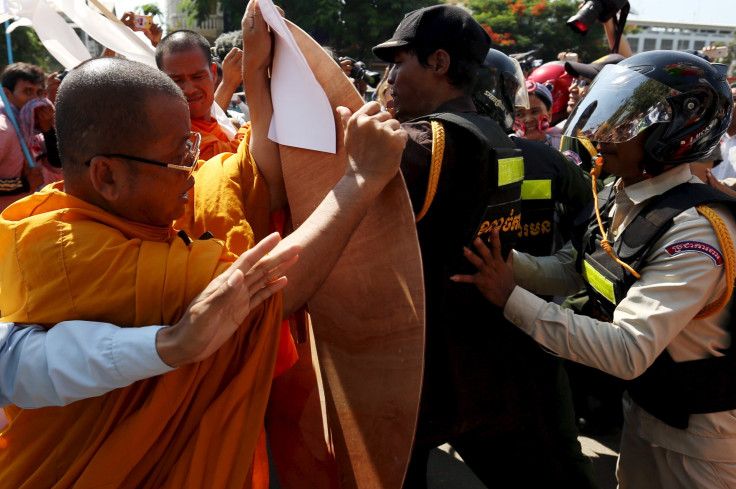Cambodia Monks Arrested For Political Oppression? Human Rights Group Slams Drug Arrest

A pair of Buddist monks in Cambodia claim the government has framed them for drug possession and weapons charges because of their political activism. The Phnom Penh Municipal Court on Monday charged Dav Tep, 28, and Chea Vanda, 30, with possession of drugs and fake documents, and with making death threats, according to Muth Piseth, their lawyer.
“My clients denied all the accusations of the police to the investigating judge because they did not do what the court charged them with,” said Piseth, an attorney working for rights group Adhoc, told Cambodia Daily. “They denied that any of that stuff belonged to them.”
Tep and Vanda were arrested Saturday morning at Angtaminh pagoda in Choam Chao commune. Police said they found a small quantity of crystal methamphetamine in their rooms, as well as a sword, knife and an ax. The men were defrocked Saturday afternoon.
Vanda said he and Tep were innocent. “We did not do this because we are monks,” he said. “If we wanted to do that, we would be normal people and go do it.”
Both men have been active in demonstrations along the Vietnamese border in recent months. “We used to go to the border ... and participate [in protests] against other social injustices,” Vanda said.
#guardiantravelsnaps of the day by @THanslienPhoto: a boy watches monks gathering in Phnom Penh, #Cambodia pic.twitter.com/zsGUVVxNKY
— Guardian Travel (@GuardianTravel) July 31, 2015Soeng Senkaruna, a senior investigator for Adhoc, said that since neither monk was present when police searched their rooms at the pagoda, the evidence collected should not be admissible in court. "We call on the court to drop all charges against them and release them,” he said.
Cambodia has a poor human rights record, according to Human Rights Watch, an international watchdog group. Cambodian authorities recently detained 100 homeless, sex workers and street children in Phnom Penh as part of the city’s preparation for major public ceremonies, including the Queen Mother’s birthday.
“Cambodian holidays and ceremonies should not be ‘celebrated’ with the arbitrary arrests of the country’s most vulnerable people,” said Phil Robertson, deputy Asia director, at the time. “Those thrown without charge into misnamed ‘opportunity centers’ should be immediately released.”
Human Rights Watch has also accused Cambodia law enforcement officials in the past of whipping detainees and beating them. More than four decades ago, millions were killed in Cambodia under Pol Pot’s brutal regime that sought to convert Cambodia into a classless, agrarian society.
More recently, a handful of monks clashed with police officers as they marched in Phnom Penh last week in front of the Senate during a protest decrying a new law to regulate nongovernmental organizations.
© Copyright IBTimes 2024. All rights reserved.












